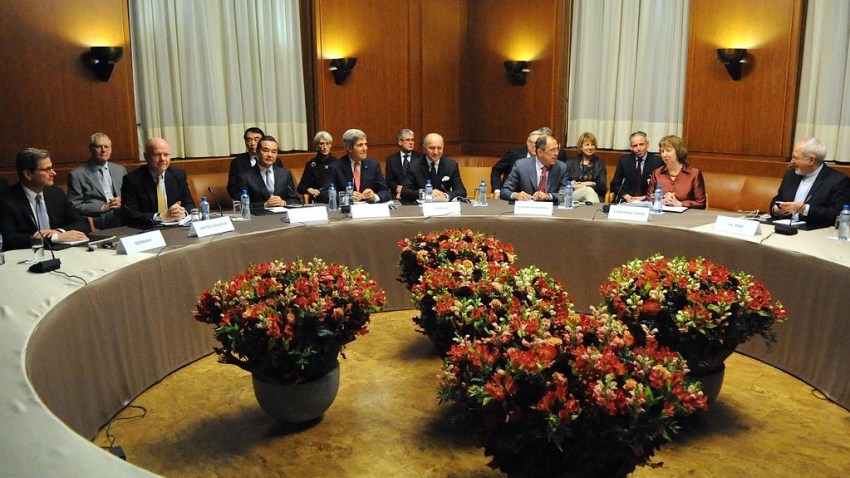Three months after Iran reached an interim agreement with the U.S. and its negotiating partners in the P5+1 to limit Iranian nuclear capabilities, the two sides announced last week that they had agreed upon a framework for negotiation of a final comprehensive agreement. In remarks in Jerusalem following the announcement, U.S. Undersecretary of State for Political Affairs Wendy Sherman
said that these negotiations, scheduled to begin March 17, will be “very tough” and “will go on through July.”
At the same time, a report from the International Atomic Energy Agency (IAEA) assessed that, in the agency’s judgment, Iran is complying with the commitments it made under the interim agreement, though there remain concerns about “possible military dimensions” of Iran’s nuclear program, which Iran insists is for peaceful purposes.
Announcing the March negotiations in Vienna alongside Iranian Foreign Minister Javad Zarif, European Union foreign policy chief Catherine Ashton
told a crowd that “we have identified all of the issues we need to address in reaching a comprehensive and final agreement.” Technical experts are scheduled to meet in early March ahead of the higher-level negotiations.
The Iran nuclear issue continues to pose political risks for the Obama administration, but the president remains convinced that the current diplomatic approach aimed at preventing Iran from developing a nuclear weapon can be a legacy-defining success. Obama has not managed to convince many lawmakers on the right to support the current diplomatic approach, at least publicly. Furthermore, members of Obama’s own party, like New Jersey Sen. Robert Menendez, continue to publicly suggest that Iran may get sanctions relief while giving the international community little in return.
“We have placed our incredibly effective international sanctions regime on the line without clearly defining the parameters of what we expect in a final agreement,”
Menendez said on the Senate floor earlier this month.
Michael Rubin of the American Enterprise Institute echoed these concerns on sanctions in an email to Trend Lines. “Iran’s economy shrank 5.4 percent in the year before Tehran’s diplomatic outreach,” he observes, and as part of the recent diplomatic push Iran has received “between $7 [billion] and $20 billion in sanctions relief and new investment just for agreeing to talk.” Rubin compares this approach to “giving a 5-year-old dessert first and then expecting him to eat his vegetables.”
Obama has sought to allay these kinds of worries in recent public statements. In remarks delivered alongside fellow P5+1 leader Francois Hollande of France earlier this month, Obama said that his administration had been “extraordinarily firm” on enforcing applicable sanctions. “We also want to send a message to the Iranians,” he added, that a failure to resolve the nuclear issue through talks will mean the sanctions “not only will stay in place but will likely be tightened.”
Israeli actions and attitudes remain a persistent factor in the administration’s calculations. Israeli Prime Minister Benjamin Netanyahu came out early as an opponent of the interim deal and has expressed continual skepticism of an approach that would leave Iran with the ability to enrich uranium and, potentially, “breakout” capability to produce a nuclear weapon within a matter of weeks or months. Sherman flew to Israel to brief officials shortly after the Vienna talks. While there, she told reporters that an Iran that can “never obtain a nuclear weapon” remains the “one measure of success of a comprehensive agreement with Iran.”
The content of Sherman’s briefing to Israeli officials was not publicly disclosed, but it did not cause Netanyahu to modify his rhetoric. Over the weekend, he
publicly expressed his concern to the Israeli Cabinet that “Iran believes that it will realize its plan to be a nuclear threshold state.” Iran’s combination of enrichment capabilities, nuclear technology and long-range missiles means “Iran is, in effect, receiving everything and giving almost nothing,” Netanyahu said.
But despite such worries, the recent IAEA report appears to support the notion that the diplomatic approach can at least temporarily produce a change in Iranian behavior. The report states that Iran’s stockpile of 20 percent enriched uranium has dropped, and that the enrichment facility at Fordow is now producing uranium enriched at a lower level. Moreover, the agency accessed more of Iran’s nuclear facilities than it had prior to the interim agreement, including those relating to centrifuge production.
The number of Iran's installed centrifuges remains unchanged, meaning Iran has neither removed centrifuges as the U.S. would like nor added additional or more advanced ones.
An additional wrinkle is the potential inclusion of Iran’s ballistic missile arsenal in the negotiations. Ballistic missiles would presumably be the primary delivery systems for a future Iranian nuclear weapon, but they have not publicly been part of the P5+1 discussions with Iran, nor were they directly mentioned in the Joint Plan of Action, the interim agreement Iran and the P5+1 parties reached in November.
White House press secretary Jay Carney told reporters last week that Iran would have to address the U.N. Security Council resolutions relating to its nuclear program before the conclusion of a final agreement. “In other words, they have to deal with matters related to their ballistic missile program,” he said.
Iran has publicly rejected this suggestion. According to the Tehran Times, Deputy Foreign Minister Abbas Araqchi
told Iranian state television over the weekend that “Iran’s defense issues are neither negotiable nor subject to compromise.” Iran would not discuss “any issue other than the nuclear dossier in the negotiations,” he added.
Even with a date set for negotiations, Rubin observes that “the history of Iran negotiations is two steps forward, two steps back, and so we need to be cautious at best.” The administration now has an opportunity to show that it can move past that dynamic.

